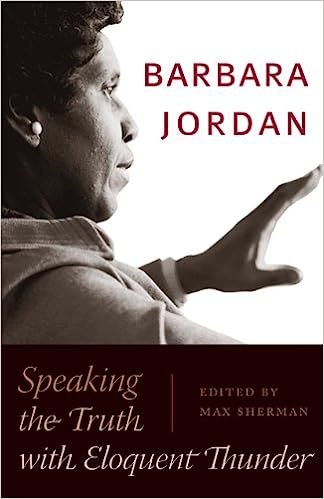TEXAS HISTORY MINUTE: Barbara Jordan
By Ken Bridges

Barbara Jordan was a woman of many firsts in her career. In her relatively short time in Congress and the Texas State Senate, she left an immeasurable impact and in a cynical and dark age in American politics, she became for many across the nation a voice of conscience.
Jordan was born in Houston in 1936, the youngest of three children. Her father was a respected Baptist minister. The church was a central part of her life in her youth, and she excelled in school. She graduated with honors from the segregated Phillis Wheatley High School in 1952.
She could not attend the University of Texas, her first choice, because segregation was still in effect. However, she went to Texas Southern University instead, studying history and political science on her way to becoming a lawyer. She became a champion debater, easily beating contenders from the most prestigious universities in the nation. After graduating with high honors in 1956, she entered Boston University School of Law, gaining a law degree by 1959.
After serving as a professor of political science for a year at Tuskegee Institute in Alabama, Jordan returned to Houston to practice law. She dove into politics, but lost two races to the state legislature in the early 1960s. In 1966, she was elected to the State Senate, the first black woman to receive such an honor in Texas. She was widely respected by her colleagues and rose to the position of president pro tem.
Over the years, it has become a tradition in Texas that both the governor and lieutenant governor leave the state for a day so that the president pro tem of the State Senate becomes acting governor for a day. On June 10, 1972, Gov. Preston Smith and Lt. Gov. Ben Barnes left Texas for a day as part of that tradition. In what became a footnote in a life of achievement, Jordan thus became the first African-American woman in American History to serve as a governor, even as only an acting governor for a day.
Later that year, she was elected to Congress, again the first black woman ever elected from Texas. She sponsored or co-sponsored hundreds of laws during her six years in Congress.
Jordan was given a place on the House Judiciary Committee, and the committee undertook the grave task of considering impeachment for President Richard Nixon for his activities during the Watergate scandal. Jordan quickly became a leader in the debate. In one famous speech in 1974, in a steady, careful voice, Jordan expressed her belief in the Constitution and the rule of law over politics. As she said to her colleagues and a nationally televised audience, “My faith in the Constitution is whole, it is complete, it is total. I am not going to sit here and be an idle spectator to the diminution, the subversion, the destruction of the Constitution.”
Nixon resigned before an impeachment vote could be taken, but Jordan became a respected leader across the nation in the process and the reforms that followed. In 1976, she became the first African-American woman to give the keynote address at the Democratic National Convention, an address that was met with thunderous applause. In 1992, she again spoke to the convention, reminding the delegates and the nation of the need for change.
Jordan declined to run for a fourth term in 1978. She returned to Texas and began teaching at the University of Texas. She served as chairman of the U. S. Commission on Immigration Reform for two years under President Bill Clinton. In 1994, she received the Presidential Medal of Freedom.
Jordan remained a beloved figure on the UT campus in her later years. However, her health continued to decline. She died in January 1996 at the age of 59. Some scholars have since listed her speeches as among the best ever spoken by an American politician. In the years since her death, a number of schools and streets have been named in her honor, including in her native Houston. As for the university she could not attend as a youth because of her skin color, the University of Texas has since erected a statue to her on campus.
PHOTOS
This collection of Barbara Jordan’s speeches, titled Barbara Jordan: Speaking the Truth with Eloquent Thunder—was edited by our friend, former Texas State Senator Max Sherman. It is a treasure, always kept close at hand, and highly-recommended reading. — Laurie Ezzell Brown
Representative Barbara Jordan shown delivering the keynote address at the Democratic National Convention on July 12, 1976. From the Library of Congress Prints and Photographs Division, Washington D.C.

